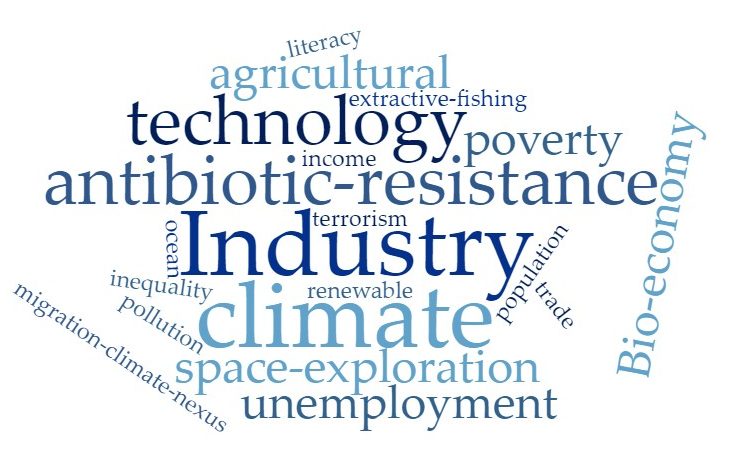
Many of the issues that society currently faces are complex and research on just one angle or area does not provide sufficient information to address the problem. These challenges are compounded when more than one region (or even the entire planet) is impacted. Many of the decisions and legislations passed by governments today will go on to impact how these issues either develop or are resolved years into the future.
How do governments ensure that the decisions they make are sustainable – that they will not only produce short-term benefits but will also go onto benefit our children and grandchildren to come?
Scientific foresight
Scientific foresight informs policymakers about future challenges and opportunities, allowing them to follow a systematic approach to determine where actions and changes in policy are required.
While this may sound simple, it is actually far from it! Foresight requires a comprehensive understanding of what the potential consequences of the decision (or lack thereof) are. This may include: the potential benefits, how severe the issue is likely to be in a business-as-usual scenario, what steps can be taken to minimise the issue, which regions or areas are more likely to be heavily impacted and what the environmental, social and economic costs are likely to be over various time scales.
The information and likely future scenarios that foresight studies provide allow policymakers to:
-
- better evaluate current policy priorities
- assess the impact of upcoming policy decisions in combination with other possible developments or challenges
- take actions that are able to pre-emptively minimise risks or expand opportunities
- identify new partners and create new connections (both internally and internationally)
- anticipate new technologies and societal demands and implement policy that helps to facilitate them
One example of where foresight is particularly useful is climate change. Foresight helps policymakers to understand what the impacts of climate change will be, where they will be the most severe and what legislation can be passed to minimise the risk and long-term costs without burdening the present generation.
What sort of issues do foresight studies research?
The issues that are research in foresight studies are extremely far reaching. Below are just a few examples of themes that have been previously researched.
How to get involved with foresight research?
At a European level, foresight processes are integrated with other EU scientific advice processes such as: informal expert groups, the Research, Innovation and Science Expert Group (RISE), the Horizon 2020 Programme, the EU’s Scientific Advice Mechanism (SAM). While it is possible for scientists to become involved through each of these platforms, the most researcher-friendly option is likely to be the Horizon 2020 Programme. You can find out more about Horizon 2020 and how its projects are advertised in our July GeoPolicy blog.
If you are living outside of the EU, knowing which organisations are working on foresight studies in your area is a good start. Almost every national government undertakes some form of foresight research. Not only this, but there are also larger regional or global initiatives undertaken by international organisations, such as the UNDP and ASEAN, as well as a large number of consultancies that undertake foresight studies and develop prioritised action plans.
Why aren’t foresight studies publicised?
Actually, they are! Governments, particularly the EU Commission, love to highlight the various foresight studies that are being used to guide policy decisions because they are generally of interest to the public and demonstrate that much of the legislation enacted is based on research. The links in the further reading section below will lead you to some of these studies.
Being a policy related blog, this post has naturally focused on the governmental and legislative use of foresight research. However, foresight can and should be used to steer both business and personal decisions. From financial investments to our education, having a greater understanding about what the future holds enables us to make more informed decisions that are more likely to have the outcome we desire! Perhaps this is just another reason to support scientific foresight and its distribution in formats more people are able to read.
Further reading
- EU Commission, Research & Innovation – Foresight
- European value changes – Signals, drivers, and impact on EU research and innovation policies





